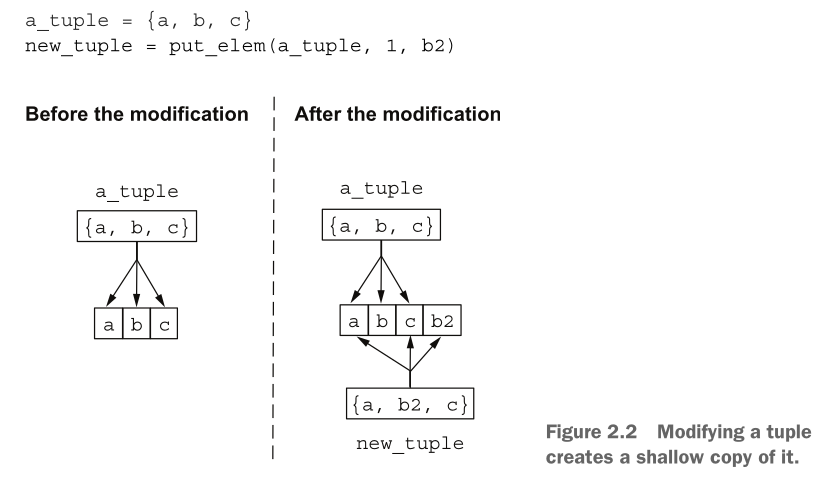The Joys of Immutability and Concurrency in Elixir
Background
Lately, I have been programming a lot in Elixir.
Elixir is a functional programming language with first class concurrency primitives and immutable data structures running on the BEAM VM.
Immutability in Elixir
In Elixir, every data structure is immutable, so instead of modifying a variable directly, functions return a new memory location with a shallow copy reflecting your changes.
You can see an example below, from Saša Jurić's Elixir in Action:

This approach is powerful: rather than tracking state changes over an object's lifetime, you can focus on composing functions that operate with straightforward inputs and outputs.
Cognitive Benefits of Immutability
Immutability makes reasoning through state changes easier to manage. Each change in state becomes a distinct, independent value:
email = "USER@example.com"
transformed_email =
email
|> Email.change_domain("newdomain.com")
# "USER@newdomain.com"
|> Email.add_tag("newsletter")
# "USER+newsletter@newdomain.com"
|> String.downcase()
# "user+newsletter@newdomain.com"
IO.inspect(email)
# Output: "USER@example.com"
IO.inspect(transformed_email)
# Output: "user+newsletter@newdomain.com"
Personally, I like this model of programming because changes to the data structure is very explicit.
On Immutability and Debugging
I worked in a few codebases where one object's values mutated so many times throughout the object's lifecycle.
Debugging issues with objects like that was a challenge -- it felt like I was working with a black box as I had to constantly track the implicit state.
I appreciate how the immutable perspective makes each transformation clear, reducing the mental overhead of tracking changes in state.
On Immutability and Testing
With immutable data structures, testing becomes simpler because we only need to verify that the functions produce the correct output for a given input.
defmodule EmailTest do
use ExUnit.Case
test "changing domain" do
email = "USER@example.com"
transformed_email = Email.change_domain(email, "newdomain.com")
assert transformed_email == "USER@newdomain.com"
end
test "adding tag" do
email = "USER@example.com"
transformed_email = Email.add_tag(email, "newsletter")
assert transformed_email == "USER+newsletter@example.com"
end
test "multiple transformations" do
email = "USER@example.com"
transformed_email =
email
|> Email.change_domain("newdomain.com")
|> Email.add_tag("newsletter")
|> String.downcase()
assert transformed_email == "user+newsletter@newdomain.com"
end
end
Concurrency
In Traditional Languages
A problem with programming concurrent applications in traditional, mutable languages is that data races can happen without explicit planning and oversight.
This is also known as the shared state model of concurrency, and it implements some challenges with concurrent read/writes to shared state, like a global variable.
In the C++ program below, we need to add a mutex to avoid a data race.
What could go wrong if we didn't have the mutex?
#include <iostream>
#include <thread>
#include <mutex>
std::mutex mtx;
int counter = 0;
void increment() {
for (int i = 0; i < 1000; i++) {
std::lock_guard<std::mutex> lock(mtx);
counter++;
}
}
int main() {
std::thread t1(increment);
std::thread t2(increment);
t1.join();
t2.join();
std::cout << counter << std::endl;
return 0;
}
In Erlang/Elixir
Erlang and Elixir take a different approach to concurrency: they adopt the actor model. Each process is very lightweight and managed by the BEAM VM.
The actor model includes:
- Process isolation
- Each process is completely isolated with its own memory and state (no memory sharing = good)
- This means processes can't interfere with each other's state directly, avoiding data races
- Message passing
- Processes communicate through asynchronous message passing
- Processes can choose how to handle each message
This is starting to sound a lot like the message-passing essence of Smalltalk :)
defmodule Example do
def listen do
receive do
{:ok, "hello"} -> IO.puts("World")
end
# Keep listening for messages
listen()
end
end
# Spawn a new process that runs the
# `listen` function
iex> pid = spawn(Example, :listen, [])
#PID<0.108.0>
# Send a message to the spawned process
iex> send(pid, {:ok, "hello"})
World # <- given the hello message, output is 'World'
# The process will only handle messages
# matching the pattern {:ok, "hello"}
iex> send(pid, :ok)
:ok
By utilizing the actor model, Erlang and Elixir enable safe, concurrent programming because there is no concept of sharing mutable state. On the application level, it becomes a joy to write concurrent programs in Elixir without fear of data races :).
Closing Notes
- Immutable data structures = good
- Because making a change to something results in a new thing, you can model program as straightforward transformation pipelines
- Easier to reason through than in messy code in most languages
- Spend more time thinking about the data structure in the local scope
- Developing correct concurrent software is really hard, especially when reading/writing to shared state
- Elixir/Erlang's actor model implementation makes this a lot better!
- Shared, mutable state = evil and headaches
Joe Armstrong (Erlang creator) has so many amazing talks. Here are some of my favorites:
- How and Why of Fitting Things Together
- The Mess We're In
- Forgotten ideas in CS
- How we Program Multicores
If you want to learn more about Elixir and Erlang, this is a great talk: The Soul of Erlang & Elixir